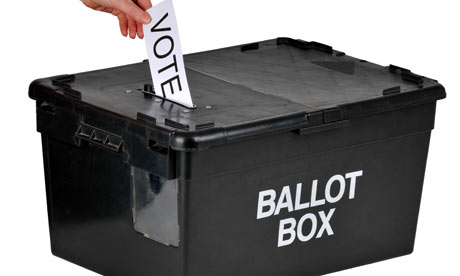Europe pressures Westminster on votes for prisoners
The UK government may be taken to the European court of human rights if it continues to deny prisoners the vote
 The Conservatives have avoided the issue of prison inmates' right to vote. Photograph: Geoff Moore / Rex Features
The Conservatives have avoided the issue of prison inmates' right to vote. Photograph: Geoff Moore / Rex FeaturesThe government faces being hauled before the European court of human rights unless it gives prisoners the right to vote as a matter of urgency.
The revelation comes as several law firms seek to launch claims on behalf of thousands of UK prisoners who are demanding compensation – estimated to be as much as £750 each – on the grounds they were illegally denied the right to vote at the last general election.
The contentious issue threatens to become another test of the Conservative and Liberal Democrat coalition. The Lib Dems were strongly critical of the previous government's refusal to enfranchise the prison population while the Conservatives have consistently avoided addressing the issue.
In March 2004, the ECHR ruled in Hirst v UK that the government's blanket ban barring sentenced prisoners from voting was unlawful. But despite the ruling, the previous government continued to consult on the issue and failed to make it law.
The committee of ministers, the body that oversees European member states' compliance with ECHR judgments, is to meet this week to discuss the UK's failure to enfranchise prisoners following the ruling.
The committee will then issue a stark public reminder to the government that it must comply with the ruling immediately. If it refuses, the committee has the power to refer the question of whether the government has failed in its obligations to the ECHR, a move that would put Westminster on a collision course with the Strasbourg-based Council of Europe.
The clash would represent the culmination of months of mounting frustration on the part of the committee. In March it warned the UK must "rapidly adopt measures, of even an interim nature, to ensure the execution of the court's judgment before the forthcoming general election", otherwise the nationwide vote would be illegal.
The Prison Reform Trust, which campaigns for prisoners to be given the vote, said the government now has no choice but to introduce measures that will enfranchise inmates. "We understand from their statements that the committee of ministers at the Council of Europe takes this matter of protracted non-compliance very seriously indeed and we hope that the new coalition government will seek to put matters right without further delay," said Juliet Lyon, director of the trust.
Penal reformers say giving prisoners the vote is about restoring a fundamental human right that will confer a sense of responsibility and aid their rehabilitation.
They point out that the UK is out of step with many other countries. Eighteen European countries have no restrictions on prisoners voting while in France and Germany a decision to disenfranchise a prisoner is left to the courts.
In Australia and New Zealand the length of a prisoner's sentence determines their right to vote. Other countries where prisoners have the right to vote include South Africa, Poland, and Canada.
But any move that recognises the ECHR ruling on prisoner voting is likely to spark an angry reaction from Eurosceptics. In the House of Lords last year Lord Tebbit attacked the measure as a form of "judicial imperialism" effectively foisted on the UK by a foreign court.
Enfranchising prisoners is supported by the Prison Governors Association and Lord Hurd, the former Conservative home secretary, has claimed that "if prisoners had the vote then the MPs would take a good deal more interest in conditions in prisons".However, the previous government, aware that some sections of the media and the public are opposed to allowing prisoners the vote, claimed there were problems with implementing the legislation. The concerns have been assuaged by the Electoral Commission which has established a mechanism by which prisoners can be enfranchised though a system of postal or proxy voting.
The government also said it was unclear which categories of prisoner should be allowed to vote. In April in the case of Frodl v Austria, the ECHR ruled that it is unlawful to disenfranchise all prisoners serving a sentence of more than one year in jail.
The court emphasised that a decision to deny a prisoner the vote should instead "be taken by a judge, taking into account the particular circumstances".
A spokeswoman for the Ministry of Justice said: "The government is considering the best way forward on the issue of prisoner voting rights. Until the approach is settled, it would not be appropriate to make further comments. Disenfranchisement is an outdated, disproportionate punishment which has no place in a modern prison system with a renewed emphasis on rehabilitation and resettlement."

Looks like this one's now hotting up.
ReplyDeleteJames: Indeed it is. Given the last quote from the MoJ, it would appear that the UK is finally coming to its senses.
ReplyDeleteWow they got more than 2 lines from the MoJ.
ReplyDeleteI take it their press officer's been replaced....
Adam: No, the comment was removed instead. I suspect that the author mistakenly used a quote from Juliet Lyon instead.
ReplyDelete